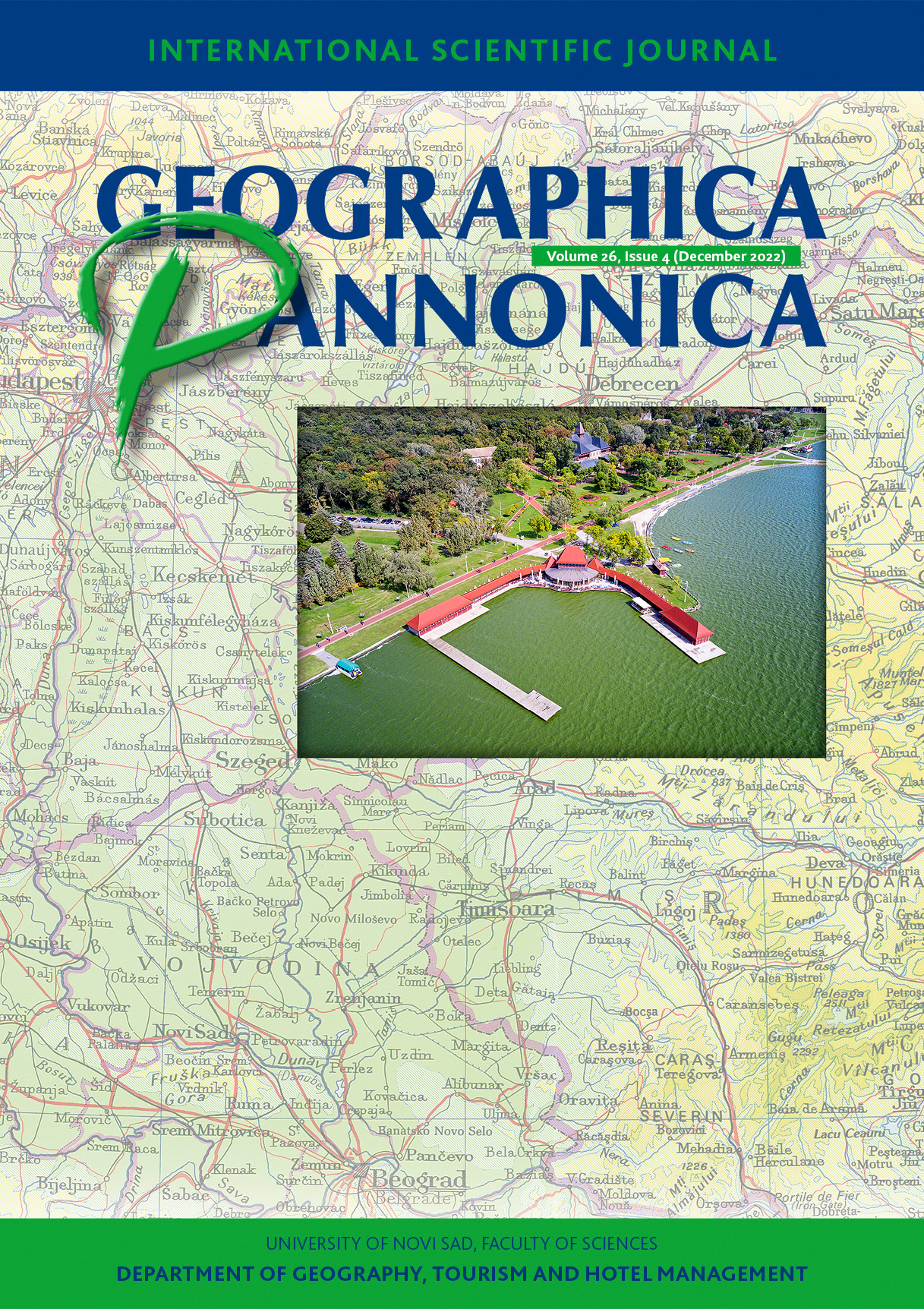Coastal regions in the geography of innovation activity: a comparative assessment of marine basins
Abstract
Across the globe marine coasts are experiencing an outstripping growth of population and economic activity, a phenomenon known as coastalization. Most global cities and industry clusters are located in coastal regions acting as economy growth nodes for their respective countries. This divergence is equally true for national innovation systems, gravitating towards highly urbanized coastal areas. The study is designed to evaluate the spatial stratification of the knowledge production between the coastal regions located in different marine basins – Azov-Black, Caspian, Baltic, Arctic, and Pacific. In order to level-out the national differences of the innovation policy and institutional architecture, the research is held on a single country – the Russian Federation. Our research hypothesis suggests that knowledge production domain of the innovation activity is influenced by urbanization and coastalization, i.e. the proximity to the core city and the coast. We also expect that coastalization factor would be reflected in intensified involvement of coastal municipalities in knowledge production networks. The study is based on processing ROSRID database of 66,647 research projects implemented in 2017-2019 and geocoded using Yandex.Maps API. The research has shown that the urbanization factor has the strongest influence in configuration of R&D networks – the core centers of knowledge production are the largest cities in marine basins that give further impetus to the involvement of neighboring municipalities. Nearly 70% of municipalities across marine basins have limited or no involvement in the knowledge production, except Baltic and Azov-Black Sea basins that feature the strongest performance. Overall, the proximity to the coast of non-freezing seas has a positive correlation with the number of R&D executed and funded. Considering the research topics, the share of marine-related research is typically funded by coastal regions, whereas the executed R&D cover a broad variety of topics. Research results enrich the notion of geography of innovation and advance our understanding of the spatial factors in knowledge distribution within the national innovation system.
References
Anderson, E. (2005). Openness and inequality in developing countries: A review of theory and recent evidence. World Development, 33(7), 1045-1063. https://doi.org/10.1016/j. worlddev.2005.04.003
Asheim, B.T., & Gertler, M.S. (2009). The Geography of Innovation: Regional Innovation Systems. In J. Fagerberg, & D.C. Mowery (Eds.), The Oxford Handbook of Innovation. (pp. 291-317). Oxford University Press https://doi.org/10.1093/oxfordhb/9780199286805.003.0011
Bilbao-Osorio, B., & Rodríguez-Pose, A. (2004). From R&D to innovation and economic growth in the EU. Growth and Change, 35(4), 434-455. https://doi.org/10.1111/j.1468-2257.2004.00256.x
Capello, R., & Lenzi, C. (2013). Territorial patterns of innovation and economic growth in European regions. Growth and Change, 44(2), 195-227. https://doi.org/10.1111/grow.12009
Capello, R. (2017). Towards a new conceptualization of innovation in space: Territorial patterns of innovation. International Journal of Urban and Regional Research, 41(6), 976-996. https://doi.org/10.1111/1468-2427.12556
Christopherson, S., & Clark, J. (2020). Remaking Regional Economies: Power, Labor and Firm Strategies, (1st ed.). Routledge. https://doi.org/10.4324/9781003071334
Cracknell, A.P. (1999). Remote sensing techniques in estuaries and coastal zones – An update. International Journal of Remote Sensing, 20(3), 485-496. https://doi.org/10.1080/014311699213280
Johansson, B., & Lööf, H. (2014). Innovation strategies combining internal and external knowledge. In C. Antonelli & A.D. Link (Eds.) Routledge handbook of the economics of knowledge. (pp. 29-52). London: Routledge.
Karlsson, C., & Gråsjö, U. (2021). Knowledge Flows, Knowledge Externalities, and Regional Economic Development. In: M.M. Fischer & P. Nijkamp (Eds.), Handbook of Regional Science. Berlin: Springer. https://doi.org/10.1007/978-3-662-60723-7_25
Malecki, E.J. (2014). The geography of innovation. In M. Fischer, & P. Nijkamp (Eds.). Handbook of Regional Science. (pp. 375-389). Berlin: Springer. https://doi.org/10.1007/978-3-642-23430-9_22
Merk, O.M., Manshanden, W.J.J., & Dröes, M.I. (2013). Inter-regional spillovers of seaports: The case of North-West Europe. International Journal of Transport Economics, 40(3), 401-417.
Mikhaylov, A.S., Mikhaylova, A.A., & Kuznetsova, T.Y. (2018). Coastalization effect and spatial divergence: Segregation of European regions. Ocean and Coastal Management, 161, 57-65. https://doi.org/10.1016/j.ocecoaman.2018.04.024
Mikhaylov, A.S., Wendt, J.A., Peker, I.Y., & Mikhaylova, A.A. (2020). Spatio-temporal patterns of knowledge transfer in the borderland. Baltic Region, 12(1), 132-155. https://doi.org/10.5922/2079-8555-2020-1-8
Philipson, S. (2020). Sources of innovation: Consequences for knowledge production and transfer. Journal of Innovation and Knowledge, 5(1), 50-58. https://doi.org/10.1016/j.jik.2019.01.002
Pontikakis, D., Chorafakis, G., & Kyriakou, D. (2009). R&D specialisation in Europe: from stylized observations to evidence-based policy. In D. Pontikakis, D. Kyriakou, & R. Bavel (Eds.). The question of R&D specialisation: perspectives and policy implications, Brussels: European Commission.
Rodríguez-Pose, A., & Crescenzi, R. (2008). Research and development, spillovers, innovation systems, and the genesis of regional growth in Europe. Regional Studies, 42(1), 51-67. https://doi.org/10.1080/00343400701654186
Rypestøl, J. O., & Aarstad, J. (2018). Entrepreneurial innovativeness and growth ambitions in thick vs. thin regional innovation systems. Entrepreneurship and Regional Development, 30(5-6), 639-661. https://doi.org/10.1080/08985626.2018.1444104
Schot, J., & Steinmueller, W. E. (2018). Three frames for innovation policy: R&D, systems of innovation and transformative change. Research Policy, 47(9), 1554-1567. https://doi.org/10.1016/j.respol.2018.08.011
Small, C., & Nicholls, R.J. (2003). A global analysis of human settlement in coastal zones. Journal of Coastal Research, 19(3), 584-599.
Sorenson, O., Rivkin, J.W., & Fleming, L. (2006). Complexity, networks and knowledge flow. Research Policy, 35(7), 994-1017. https://doi.org/10.1016/j.respol.2006.05.002
Švarc, J., & Dabić, M. (2017). Evolution of the Knowledge Economy: a Historical Perspective with an Application to the Case of Europe. Journal of the Knowledge Economy, 8(1), 159-176. https://doi.org/10.1007/s13132-015-0267-2
Witte, P., Slack, B., Keesman, M., Jugie, J., & Wiegmans, B. (2018). Facilitating start-ups in port-city innovation ecosystems: A case study of Montreal and Rotterdam. Journal of Transport Geography, 71, 224-234. https://doi.org/10.1016/j.jtrangeo.2017.03.006

